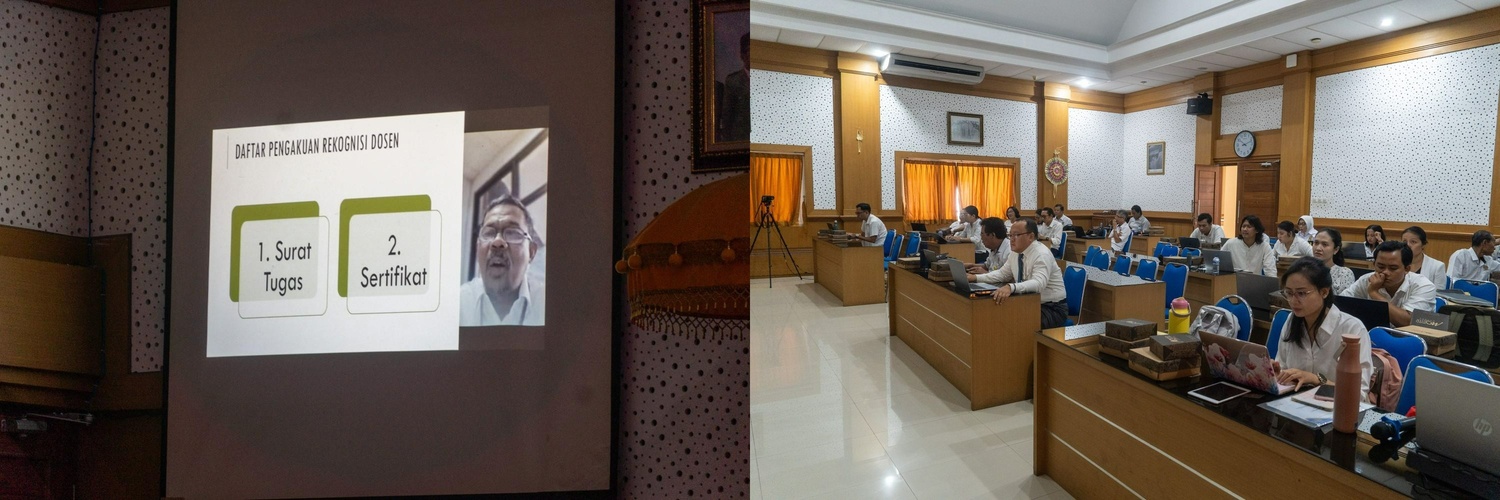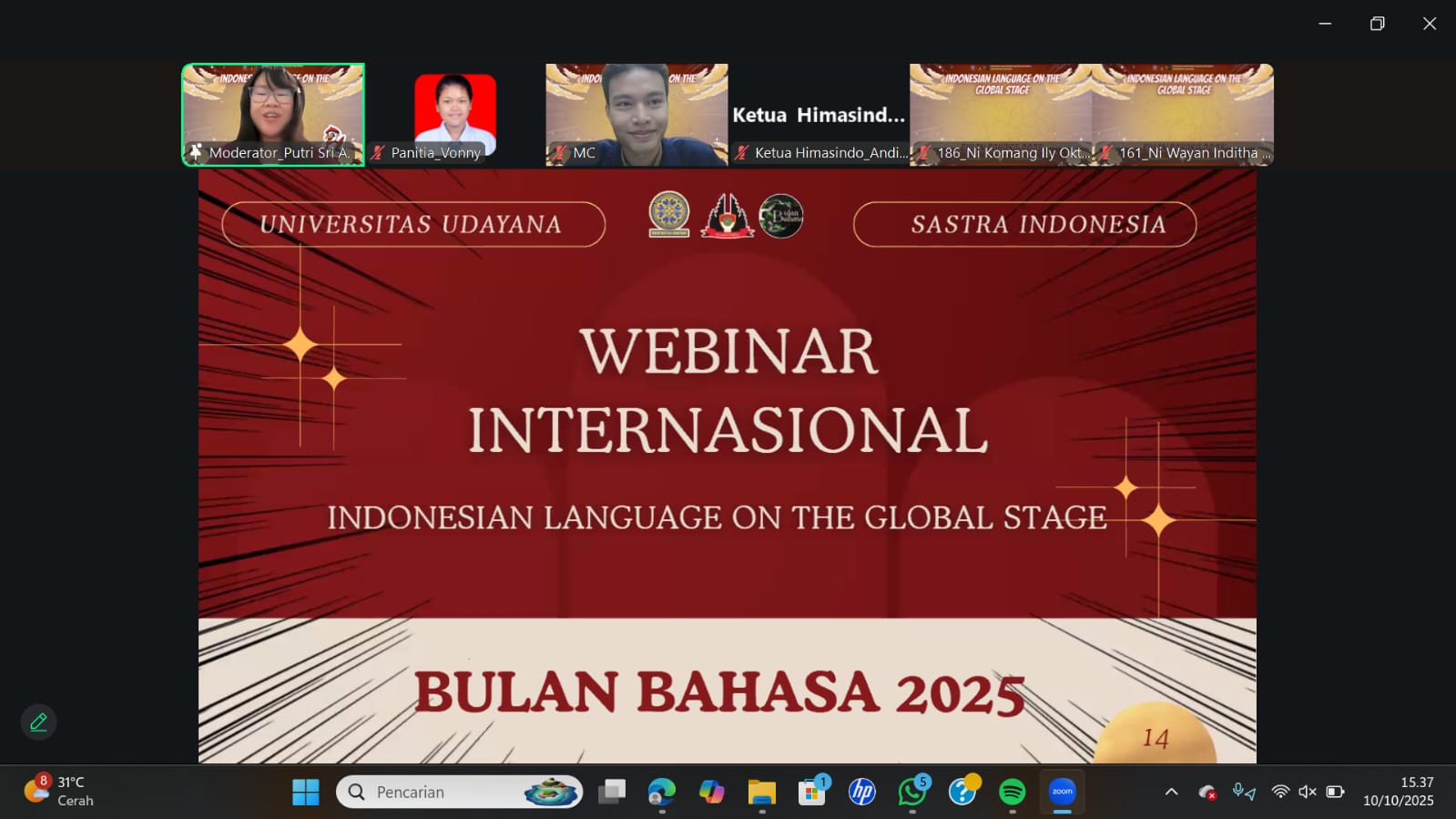Faculty of Humanities, Udayana University Holds Workshop on Case-Based Learning Methods
On Tuesday, August 26, 2025, the Faculty of Humanities, Udayana University, through the Learning Development and Quality Assurance Unit (UP3M FIB Unud), held a Case-Based Learning Method Workshop. The workshop was held in a hybrid format at the Priyono Room, 4th Floor of the Poerbatjaraka Building, FIB Unud. The event was attended by the Dean of the Faculty of Humanities, Udayana University, the Vice Dean I for Academic and Planning Affairs, FIB Unud, the Study Program Coordinators within FIB Unud, the Head and Team of UP3M FIB, representatives from the Quality Assurance Implementation Team (TPPM) for each study program, and representatives of FIB Unud lecturers.
The event opened with remarks from the Dean of FIB Unud, Prof. I Nyoman Aryawibawa, S.S., M.A., Ph.D. In his remarks, he conveyed the importance of this workshop as a refresher on Case-Based and Project-Based learning that can be applied in the classroom. He emphasized that this workshop is highly relevant now, as classes have not yet begun. Therefore, the workshop's outputs can be directly applied when classes begin. After delivering his opening remarks, he officially opened the workshop.
The workshop was divided into two sessions with two speakers. The first session discussed CPL Measurement in Case-Based Learning/Project-Based Learning Methods. The moderator for this session was Sri Lestari, S.S., M.Si., a lecturer from the History Study Program. The first speaker at the workshop was Prof. Dr. Ahmad Yani, M.Pd., from the Indonesian University of Education. In his presentation, he distributed a Google Form containing questions related to learning. One of the questions was "What is the nature of learning?", and some addressed cognitive development and conceptualization of learning experiences.
In response, he stated that a good curriculum is one that believes what is passed on to students can be used in society. Activities that contribute to knowledge acquisition include lectures, providing materials, and reading books, while activities that contribute to knowledge application include answering questions. In light of the current context, what needs to be examined is how students come to campus and directly apply their knowledge through the knowledge they have acquired through reading books, the internet, and other resources.
The resource person also explained the differences between "project assignments" and Project-Based Learning (PBL). Projects are defined as supplementary learning, following teacher direction, focusing on products, often unrelated to academic standards and job skills, and being able to be completed independently. Project-based learning is categorized as learning integrated into projects, driven by student inquiry, focused on products and processes, aligned with academic standards and successful skills, and involving collaboration with students and teacher guidance.
The resource person also explained the risks of PBL. While PBL can produce good results, if implemented poorly, two problems arise. These problems include many assignments and activities labeled as "projects" but not PBL, and projects that backfire on unprepared educators, resulting in wasted time, frustration, and a failure to understand the potential of PBL. Continuing this topic, the resource person explained the requirements for determining a Project-Based theme. These include that the project must be related to competencies and products, authentic and relevant to the real world, encourage collaboration, be measurable and time-limited, allow for creativity and innovation, and be supported by learning resources.
Following the presentations in the first session, the agenda continued with the second session, discussing the PDDIKTI IKU-7 Reporting at Udayana University. The speaker, I Nyoman Prayana Trisna, was from the Higher Education Base Reporting Management Unit (UP3D). He is a lecturer in the Faculty of Engineering, Udayana University. The speaker explained that UP3D is a new unit at Udayana University. In his presentation, he explained the technical aspects of the IKU 7 Learning Evaluation Reporting. The first step is to understand the changes in the data collection process: data is collected on evaluation components per class and grades per evaluation component within each class.
Furthermore, courses will be counted if all opened classes meet the minimum weight criteria. Courses must also have classes and participants (students), and courses with the same name are counted as one course. Furthermore, data collection on the Semester Learning Plan (RPS) link is carried out in the Evaluation Plan description section of the Course menu. At the end of the second material, the resource person also explained that in order to achieve IKU-7 for Udayana University, the target needed to be achieved is 40% for S1, DIV, and DIII courses, and these courses must use the Case Method and/or Team Based Project.



UDAYANA UNIVERSITY